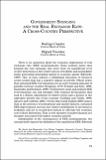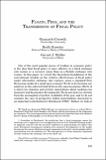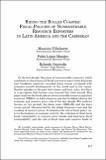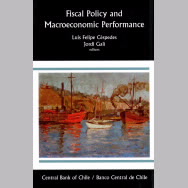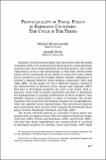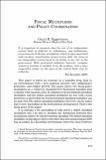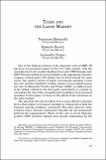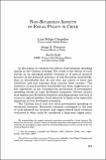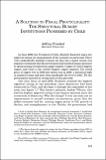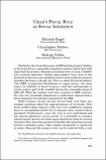Buscar
Mostrando ítems 1-10 de 12
Government spending and the real exchange rate: a cross-country perspective
There is no consensus about the economic implications of real exchange rate (RER) misalignments. Some authors argue that keeping the real exchange rate away from its equilibrium level creates distortions in the relative prices of tradable and nontradable goods generating misleading signals to economic ...
Floats pegs and the transmission of fiscal policy
One of the most popular pieces of wisdom in economic policy is the idea that fiscal policy is more effective in a fixed exchange rate regime or a currency union than in a flexible exchange rate regime. In this paper we revisit the theoretical foundations of the conventional wisdom on the relative ...
Riding the roller coaster: fiscal policies of nonrenewable resource exporters in Latin America and the Caribbean
In the last decade the prices of nonrenewable resources which constitute a critical source of fiscal revenue in many Latin American and Caribbean countries recorded sharp swings correlated with economic growth developments in the world and in the region. Similar episodes in the past led to boom and ...
Fiscal policy and macroeconomic performance
The fiscal developments around the global financial crisis of 2007-2009 and its aftermath are undoubtedly a major factor behind that comeback. The large fiscal stimulus packages adopted by many countries in the face of large adverse shocks have triggered an unusually heated debate among academics, ...
Procyclicality of fiscal policy in emerging countries: the cycle is the trend
Economic research on fiscal policy has shown that while developed economies tend to run countercyclical fiscal policies Latin American countries have been characterized by procyclical policies. One of the explanations given to this phenomenon is that high external debt causes severe constraints on the ...
Fiscal multipliers and policy coordination
This paper is about an economy in a liquidity trap that is an environment with a zero nominal interest rate deflationary pressures and subpar growth. The paper shows two fiscal policy multipliers in a relatively standard New Keynesian liquidity trap economy with taxation costs. It computes real ...
Taxes and the labor market
One of the defining features of the financial crisis of 2008?09 has been its persistent impact on the U.S. labor market with the unemployment rate roughly doubling from early 2008 through mid2010. This has ignited an intense debate on the appropriate stimulus response of fiscal policy. The debate has ...
Non-ricardian aspects of fiscal policy in Chile
In this paper we examine the effects of government spending shocks in the Chilean economy. The study of the effects of such shocks in an emerging market economy is of special interest because of the potential presence of non-Ricardian households that is households that do not own any assets or have ...
A solution to fiscal procyclicality: the structural budget institutions pioneered by Chile
In June 2008 the President of Chile Michelle Bachelet had a low approval rating for management of the economy in particular. There were undoubtedly multiple reasons for this but a major reason was popular resentment that the government had resisted intense pressure to spend soaring receipts from copper ...
Chile’s fiscal rule as social insurance
Well before the Great Recession of 2009 put fiscal policy debates in the front burner commodity-exporting countries had to deal with important fiscal policy dilemmas stemming from revenue volatility and eventual depletion. Chilean policymakers have been at the forefront in this area since adopting a ...

